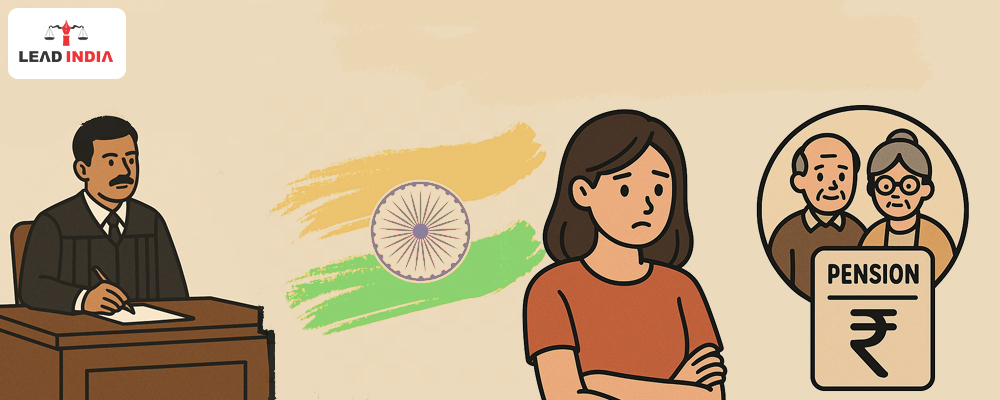What Is Rule 54 of the CCS Pension Rules?
That the Rule of 54 is part of the Central Civil Services (Pension) Rules, 1972, designed to provide family pension to the dependents of a deceased government employee or pensioner. The rule mostly covers spouses, kids, dependent parents, and incapacitated siblings, but it contains unmarried, widowed, and divorced daughters under explicit conditions.
Who Exactly Is Eligible? Here’s the Rule in Simple Terms
If you’re an unmarried daughter of a government employee who passed away while in service or after retirement, you are eligible for family pension under Rule 54 provided:
- You remain unmarried, and
- You are not earning a regular income
If either of these changes—if you get married or start earning—your eligibility ends.
What If the Daughter Is Divorced or Widowed?
That was something I specifically looked into.
- A divorced daughter becomes eligible from the date her divorce is legally finalized.
- A widowed daughter becomes eligible after her husband passes away—again, only if she doesn’t remarry or begin earning.
The government recognizes both these situations as grounds for financial dependency, just like an unmarried daughter.
The Fine Print: Conditions You Shouldn’t Miss
Here are some key scenarios that aren’t always obvious but make a big difference when applying.
Need A Legal Advice
The internet is not a lawyer and neither are you. Talk to a real lawyer about your legal issue

What If She Has Siblings?
If the daughter has younger siblings who are minors or dependent, she can only receive the pension after they turn 25 or become financially independent. The pension moves in birth order once eligibility shifts.
What Happens If There Are Twins?
If an unmarried daughter has a twin sister, and both are eligible, the family pension is divided equally between them.
What If Both Parents Were in Government Service?
If both parents were government employees, and both passed away, the daughter may be entitled to two separate pensions—one from each parent’s service record.
Does the Law Say Anything About Adopted Daughters?
Yes. If the daughter is adopted by the spouse (not the pensioner), her eligibility for family pension can be denied. The relationship has to be legally and directly tied to the deceased government employee.
What If the Daughter Is Disabled?
If the daughter is mentally or physically disabled, she may receive the family pension for life—even beyond age 25. If the disability is temporary or partial, the pension can be paid until she turns 25 or becomes self-reliant.
In either case, medical certification is required to establish the condition.
A Lesser-Known Rule: Pension Is Not Counted as Income
If the daughter is already receiving one pension (say, from the mother’s side), and later becomes eligible for a second (from the father’s), the first pension is not treated as “income” for disqualification. This can make a difference in cases of dual eligibility, especially when applying through different pension sanctioning authorities.
What If the Deceased Parent Was Divorced?
Even if the deceased parent was separated or had filed for divorce, the daughter still retains her right to pension—as long as she meets the other conditions (unmarried, dependent, not earning).
Final Takeaways – What I Learned About Family Pension for Daughters
If you’re an unmarried, widowed, or divorced daughter, and your parent was a government employee or pensioner, you may be eligible for family pension.
- The pension continues until you marry or start earning.
- Disabled daughters may receive lifelong pension.
- Special cases like twins, double pensions, and birth order do affect how pension is distributed.
- You’ll need to submit the right documents—death certificate, legal heir certificate, marital status proof, income declaration, and disability certificate, if applicable.
- Always check with the Pension Sanctioning Authority for updates, as they handle final approvals based on your documents.
One can talk to a lawyer from Lead India for any kind of legal support. In India, free legal advice online can be obtained at Lead India. Along with receiving free legal advice online, one can also ask questions to the experts online free through Lead India.
FAQs
1. What income level disqualifies an unmarried daughter from receiving family pension?
Rule 54 does not specify an exact income threshold, but any form of regular employment or self-employment that provides financial independence can disqualify a daughter. The pension authority typically evaluates whether the daughter is dependent or earning a livelihood.
2. Is family pension available to daughters of employees from state government services?
This article focuses on Central Government employees under CCS Pension Rules. State government employees have separate pension regulations, which may or may not mirror Rule 54. Applicants should check with their respective State Pension Department.
3. Is revalidation or re-verification required for the pension to continue?
Yes. Pension disbursing authorities may conduct annual life certificates or income and marital status re-verification to ensure ongoing eligibility. Failure to submit timely documents may lead to suspension of the pension.
4. Can a stepdaughter claim family pension?
Stepdaughters are not automatically eligible. Eligibility depends on whether the stepdaughter was legally adopted or dependent on the deceased government servant. Each case is evaluated individually by the pension authority.
5. Does the family pension amount differ based on daughter’s age or status?
No, the amount remains the same as defined by the CCS Pension Rules, usually a percentage of the last drawn salary of the deceased employee. The duration of payment changes based on marital or employment status, but not the payout amount itself.
6. Can pension be claimed after a long delay following the parent’s death?
Yes, but delayed applications may require justification and extra documentation. There is no strict time bar, but pension authorities can ask for:
- Reasons for delay.
- Proof of continued eligibility during the delay.
- Backdated dependency certificates or legal heir documents.





 Talk to a Lawyer
Talk to a Lawyer